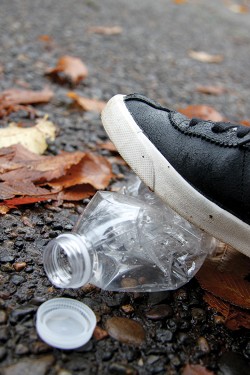Paying outrageous markups for the sake of “convenience” is common practice in the U.S., but we tend to forget that we set aside quality, safety and morality in the effort to save a couple seconds of extra “work.”
The epitome of this phenomenon is an American staple: bottled water.
Here in the U.S., where we enjoy virtually unlimited clean and pure drinking water free from our kitchen taps, the bottled water industry is worth a hearty $22 billion. Moreover, Americans consume an estimated 29 billion bottles of water per year.
I don’t care what you waste your money on, frankly. What does put a snake in my boot is the impact the billions of nonreusable resources have after they’ve served their 15 minutes of purpose.
National Geographic reported on its website that the amount of oil required to make 29 million plastic bottles—17 million barrels—is enough to fuel 1 million gas-powered vehicles for an entire year, and that “if you were to fill one-fourth of a plastic water bottle with oil, you’d be looking at roughly the amount used to produce that bottle.”
The Earth Policy Institute estimates that the bottled water industry uses 50 million barrels of oil to pump, process and transport what’s been flowing through people’s pipes via gravity since the Romans.
People who drink bottled water have fallen victim to a brilliant marketing campaign by the bottled water companies.
There’s this theory on bottled water that Americans possess: Ask any teenage girl why she would rather pay $3 for a bottle of water than use the tap, and she—like millions of Americans—will tell you that tap water is dirty and has an unpleasant taste.
The real reason people drink bottled water is ignorance.
A four-year study of bottled water conducted by the National Resources Defense Council found that 22 percent of the water failed to meet some states’ contaminant limits. If you try reusing your emptied bottle, or let it sit in any warm climate, you’re subjecting yourself to harmful petrochemicals, including the carcinogen Bisphenol A.
What’s more, companies such as Dasani (Coca-Cola Co.) and Aquafina (PepsiCo Inc.) get their water straight from municipal tap water systems anyway.
People assume recycling those plastic bottles fixes everything. While recycling is a fantastic alternative to throwing the bottle away, it doesn’t help as much as you may think. The recycling process takes a considerable amount of energy, and the raw material gained from recycling plastic is essentially worthless.
According to National Geographic only 12 percent of plastic water bottles even get recycled, though, leaving about 40 million bottles going into landfills each day. Once they’re in that landfill they’ll stay there for the next 700 years.
The solution: Don’t create the bottles in the first place.
To initiate this, I call for a ban on all bottled water sales at Portland State. Then our school can join the 90-plus American universities, including Harvard and Brown, that have banned the sale of bottled water. If the convenience factor is eliminated, then not only will we not violently rape the Earth, but PSU can add one more checkmark to its pro-sustainability column.
PSU is always boasting of its “eco-friendliness,” but it’s completely hypocritical for us to sell such an environmentally harmful product. The university claims its hydration stations reduce the use of water bottles, but I don’t see much of an effort to stop the sale of a profitable product.
It’s true that banning bottled water would forfeit money in contracts with the soda companies, but all things considered, a couple grand out of a PSU’s projected revenue of $259,730 for the 2011-13 biennium isn’t going to shut the school down.
You might wonder how people are supposed to get water on campus, and the answer is quite simple: Walk to a fucking bottle-filling station.
We need to take action, and sooner than later. We can’t expect to topple the entire industry, but as individuals we can work to reduce our own impact.
The decision to ban bottled water sales would help promote responsible consumer habits and foster awareness of what we buy and how it affects us and nearly every aspect of life on Earth.



